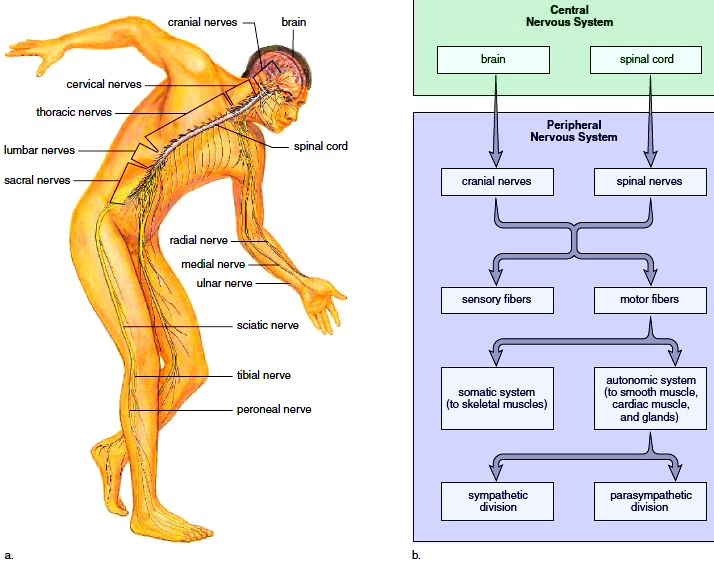The human nervous system is one of the most complicated yet vital parts of the body. It is through the nervous system that all the body’s activities are coordinated and controlled as well as regulated. The central nervous system refers to the brain and spinal cord and the peripheral nervous system refers to all other parts of this system.
Along with the spinal cord and the brain, the central nervous system also includes the sensory organs of smell and taste, the eyes, the ears, and the sensory receptors that are in the muscles, joints, skin, and other parts of the body. As the senses take in information, this information is relayed back and forth to the brain through the nervous system and in turn, the body’s movements and functions are signaled, regulated and controlled. The nervous system responds to touch, temperature, and other sensory input by sending signals to the body to respond accordingly, and also continuously sends signals to internal organs so as to regulate their function.
Nervous System Disorders, Diseases and Conditions
As with all other parts of the body, the nervous system can be subject to disorders, diseases, and various conditions. These typically result from trauma or accident, infections, defects, degeneration of parts of the nervous system, autoimmune disorders, and disruption of healthy blood flow. These disorders, diseases and conditions often include the following:
- Stroke, hemorrhage, heart attack, and swelling of the brain are common disorders the human nervous system and these interrupt its electrical signal output. Structural disorders of the nervous system may include carpal tunnel syndrome, Bell’s palsy, injury to the brain or spinal column and cord, tumors of the brain or spinal cord, and neuropathy.
- Degeneration of the human nervous system is the result of Parkinson’s disease, Alzheimer’s disease, amyotrophic lateral sclerosis or ALS, and other such diseases. Functional disorders may include epilepsy, headaches including migraines, dizziness, and neuralgia.
Symptoms of Neurological Disorders
There are various symptoms of neurological disorders that may occur, and each patient will experience these to varying degrees or may not experience them at all. These symptoms are also not limited to neurological disorders and conditions.
They may include sudden headache or persistent headache, loss of feeling in one’s extremities or tingling sensations, loss of muscle strength especially with a sudden onset, double vision or loss of sight especially with a sudden onset, extreme and persistent memory loss, extreme and persistent lack of coordination, rigid muscles or other stiffness, seizures or persistent tremors, severe back pain especially if it should radiate to the lower extremities, sudden impaired thinking abilities, or slurring of the speech.
Treatment of Neurological Diseases and Conditions
The treatment of neurological diseases and conditions will depend on the condition and its severity. Some are controlled with medication whereas others may require specialized surgery. Those with Parkinson’s disease may find that their tremors are more controlled with certain medicines whereas those with conditions caused by tumors may need surgical intervention.
